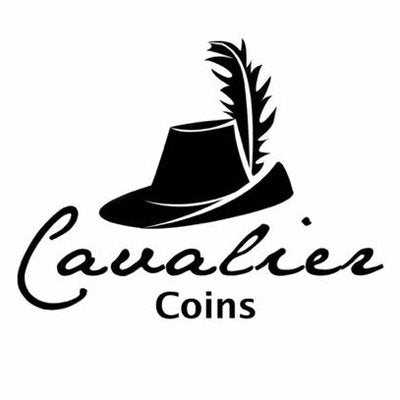Finding trusted local coin experts in the UK starts in one place: the British Numismatic Trade Association (BNTA). Think of it as the gold standard for finding credible, vetted professionals you can actually trust.
Finding Trusted Local Coin Experts in the UK
Your entire journey in numismatics, whether you’re buying your first coin or selling a lifelong collection, really hinges on finding a reputable specialist. A quick online search is a decent starting point, but the real work begins when you move past the generic results to find genuine experts.
The goal is to build a shortlist of dealers who aren't just local, but who also specialise in what you're interested in.
The UK's coin collecting scene is a lively mix of dealers, auctions, and fairs. The BNTA sits right at the centre of it all, accrediting trustworthy professionals and giving collectors a reliable directory. Major events like the quarterly London Coin Fair are fantastic places for collectors and dealers to meet, and you'll often see historic British coins go under the hammer at renowned auction houses like Spink & Son.
Refining Your Local Search
To really zero in on the right dealer, you need to think a bit more strategically about your search terms. Instead of just typing "coin shop," get specific.
Try searches like:
- "Roman coin specialist Kent"
- "British hammered coin dealer Manchester"
- "Modern proof set valuation near Birmingham"
This approach helps you cut through the noise and connect with dealers who have a deep, focused knowledge of your particular niche. If you're curious about how these local businesses get themselves noticed online, it’s interesting to look into the general effective local search ranking strategies they use to connect with customers like you.
Before you even make contact, it’s worth spending a few minutes vetting any dealer you find. A quick check of these credentials can save you a lot of time and trouble down the road.
Quick Guide to Vetting a Local Coin Dealer
Use this checklist to quickly assess the credibility of any local dealer you find.
| Credential | What It Signals | How to Verify |
|---|---|---|
| BNTA Membership | Professionalism and adherence to a strict code of ethics. This is non-negotiable. | Search the official BNTA member directory on their website. |
| Established Presence | A physical shop or long-standing online presence indicates stability and experience. | Check their "About Us" page, look for their address on Google Maps, and see how long their website has been active. |
| Clear Specialisation | Expertise in a specific area (e.g., Roman, Medieval, Modern). | Review their website's inventory or "About" section. A specialist will proudly display their focus. |
| Positive Reviews | Genuine customer feedback on Google, Trustpilot, or collecting forums. | Look for detailed reviews that mention specific experiences, not just generic praise. |
| Professional Website | High-quality images, clear information, and secure contact methods. | The website should be easy to navigate and look professional, not like a hastily put-together page. |
A solid dealer will tick all, or at least most, of these boxes. If you're seeing red flags at this stage, it's best to simply move on to the next name on your list.
A great local dealer does more than just transact; they offer insights, share knowledge, and build a long-term relationship based on trust. Their expertise is your most valuable asset.
Ultimately, finding the right local expert is the most important first step, whether you need a collection appraised or you're just starting out. For those specifically looking to part with their coins, our guide on where you can sell old coins offers some extra pointers.
Right, you've got a list of potential dealers. Now comes the crucial bit: figuring out who you can actually trust with your collection. Vetting a dealer's reputation is more than just a quick peek at their website; it's about digging a little deeper to make sure your coins are in good hands.
The first, and frankly non-negotiable, credential to look for is membership in the British Numismatic Trade Association (BNTA).
Think of a BNTA membership as a seal of approval. It shows the dealer is committed to a strict code of ethics and professional conduct. It's the baseline for any serious search for "rare coin dealers near me."
You can easily check if a dealer is a current member by heading over to the BNTA's official website. They have an online directory which is an essential tool for any collector in the UK.
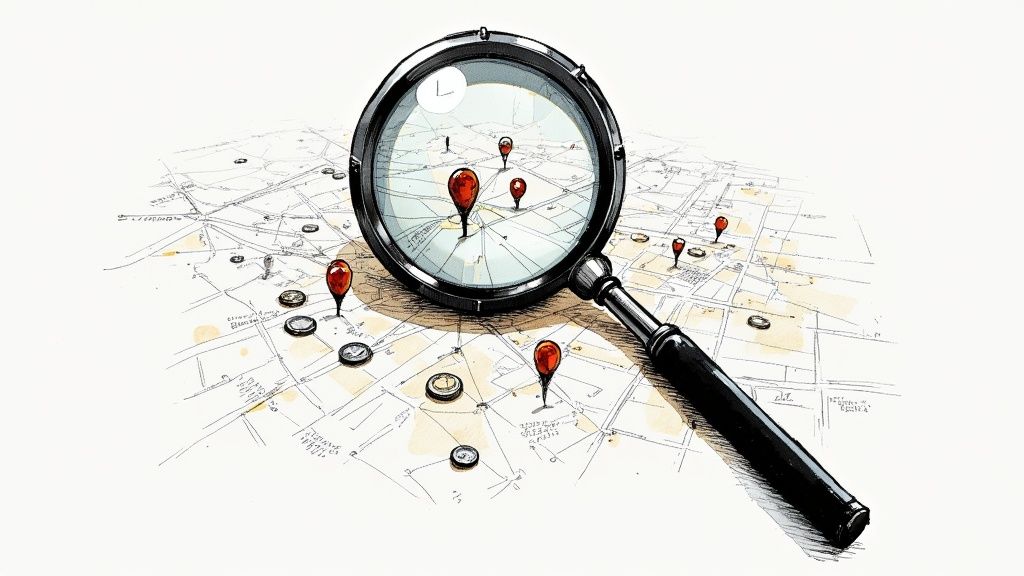
This one simple check gives you immediate peace of mind that you're dealing with a recognised professional. Once that's confirmed, it's time to look at what they actually specialise in.
Look Beyond Generalist Claims
Be wary of dealers who claim to handle "all coins." A true specialist has a clear focus, and it will be obvious from their inventory and the content on their website.
For instance, a dealer who's an expert in British hammered coins will have detailed listings, high-quality photos of those specific coins, and maybe even blog posts on the subject. A generalist, on the other hand, might just have a random assortment with no real depth in any single area.
Why does this matter so much? A specialist brings three key things to the table:
- Accurate Valuations: They know the subtle differences in grade and rarity that determine a coin's true value within their niche.
- Fair Market Prices: Their finger is on the pulse of current market trends, ensuring you get a fair price whether you're buying or selling.
- Expert Advice: They can offer insights and guidance that a general dealer simply can't match.
A dealer's specialty directly impacts the quality of advice and the price you'll receive. Mismatching your collection with a dealer's expertise is one of the most common—and costly—mistakes collectors make.
This same critical eye should be applied to online reviews. Don't just look at the star rating. Dig into the comments for detailed feedback. Reviews that mention a specific transaction, the appraisal process, or how helpful the dealer was give you a much better feel for what to expect. This is especially vital when you need guidance on complex topics, and you can learn more about how to get coins graded from our detailed guide.
Preparing for Your First Dealer Consultation
Walking into a specialist coin shop for the first time can feel a little daunting, I get it. But with a bit of prep work, you can turn that feeling of intimidation into one of empowerment. Knowing what to bring and what to ask makes all the difference—it makes your visit productive and shows any reputable dealer you're serious.
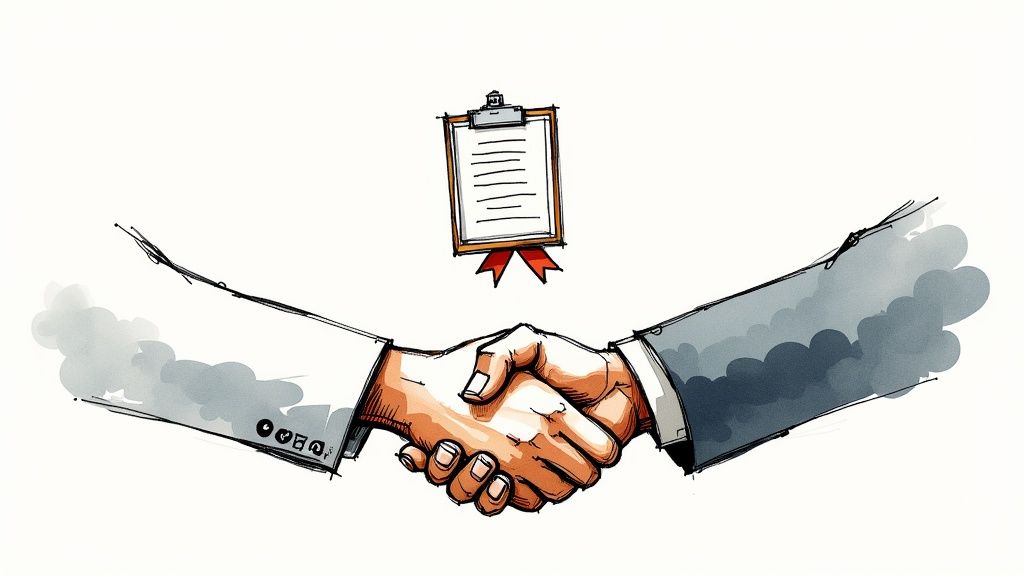
Before you even leave the house, get your essentials in order. This isn't just about grabbing the coins; it’s about having their whole story ready to go. Organise everything neatly and bring along any documents you have.
This includes things like:
- The Coins: Make sure they're safely tucked away in proper holders or flips to stop them from getting scratched or damaged in transit.
- Provenance: Gather up any certificates of authenticity, old receipts, or even just family notes about where the coins came from. Every little bit helps.
- Your Questions: Jot down a list on your phone or a notepad. Trust me, it’s easy to forget what you wanted to ask in the moment.
Showing up prepared like this is a sign of respect for the dealer's time and expertise. It sets a brilliant tone right from the start.
Knowing What to Ask
Arriving with a few smart questions is the best way to get the information you really need. Instead of just sliding your coins across the counter and asking, "What are these worth?", try to dig a bit deeper. You want to understand their process and how they do business.
This approach helps you build a proper rapport and figure out if they're the right expert for you.
Try asking questions along these lines:
- "Could you walk me through your process for valuing a collection like mine?"
- "If I were to sell through you, what are your consignment fees and payment terms?"
- "Looking at the current market, are there any particular pieces here that are especially in demand?"
- "Do you have a specialism in this particular era or type of coin?"
These sorts of questions open up a real conversation and give you a much clearer picture of how they operate.
Pro Tip: When you're at the counter and it's time to handle your coins, always hold them by their edges between your thumb and forefinger. Never, ever touch the face of the coin. The oils and fingerprints from your skin can cause permanent damage and tank its value. It’s a simple bit of numismatic etiquette that shows you respect the hobby.
Understanding How Your Coins Are Valued
What makes one coin worth just pocket change and another a small fortune? It all comes down to the valuation process, and once you grasp it, you’ll feel much more confident when talking to a local coin dealer. It's not about some secret formula, but rather four core pillars that every professional appraises.
At the heart of any valuation are rarity, grade (its condition), provenance (its history), and the current market demand. Each one is crucial. Rarity is pretty straightforward – if fewer were minted, the value potential shoots up. But the grade? That’s where the real detail lies.
The Critical Role of Coin Grade
A coin’s physical condition, its grade, can have a massive impact on what it's worth. A tiny, almost invisible scratch, a bit of wear on the highest point of the design, or a slight loss of its original shine can be the difference between a coin worth £10 and one commanding £1,000.
Take a Victorian silver Crown, for example. An uncirculated one, looking fresh from the mint, is in a completely different league financially than one that's been rattling around in pockets for decades, even though they’re technically the same coin.
This is exactly why a dealer's appraisal is so important. They’re not just identifying the coin; they’re meticulously examining its condition against internationally recognised standards. If you want to dive deeper, we have a detailed guide that explains all the factors that influence rare coin pricing.
A "fair market price" isn't just a number pulled from a book. It's a dynamic figure that reflects the coin's specific condition, its history, and what a willing buyer would pay for it in the current market.
This visual gives you a simple overview of the journey from finding a dealer to finalising a sale.
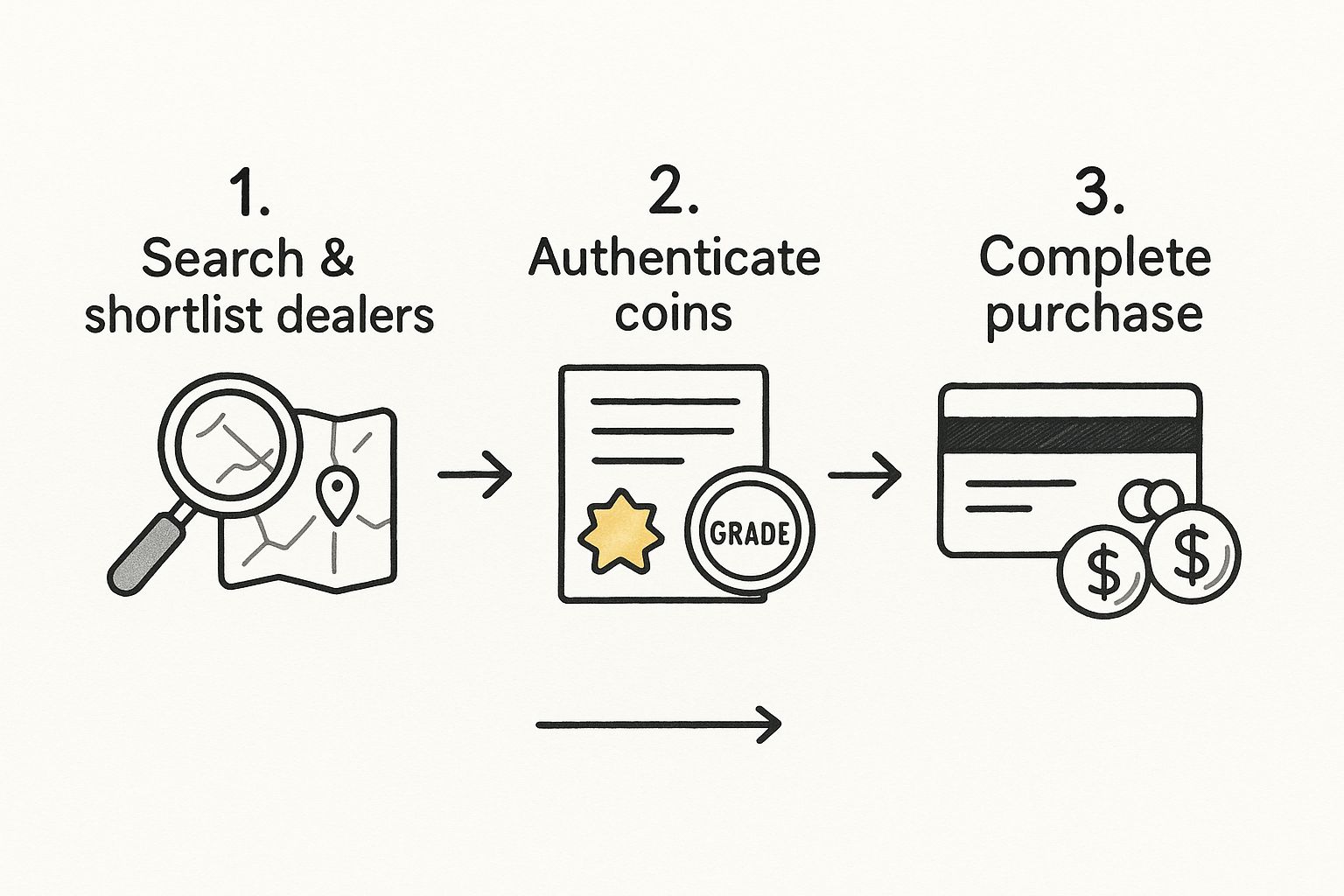
As the infographic shows, getting your coins authenticated and professionally graded is a central step before any deal is done, which really drives home just how important condition is.
The market for rare UK coins has seen some incredible growth, with certain mint errors achieving mind-boggling prices. For instance, a flawless 1995 UK 5 pence coin with a minting error reportedly sold for $1.43 million, while a 1992 specimen with a rotated die error fetched an amazing $1.65 million.
These sales are perfect examples of how rarity and unique flaws can launch a coin's value way beyond its face or metal content. You can see more incredible examples in this fascinating video on rare coin sales.
How to Avoid the Common Pitfalls When Selling Your Coins
Deciding to sell your coins can be an exciting step, but it's a world filled with potential traps for the unwary. Honestly, knowing the common mistakes other collectors make is your best defence. It's what separates a profitable, positive experience from a disappointing one.
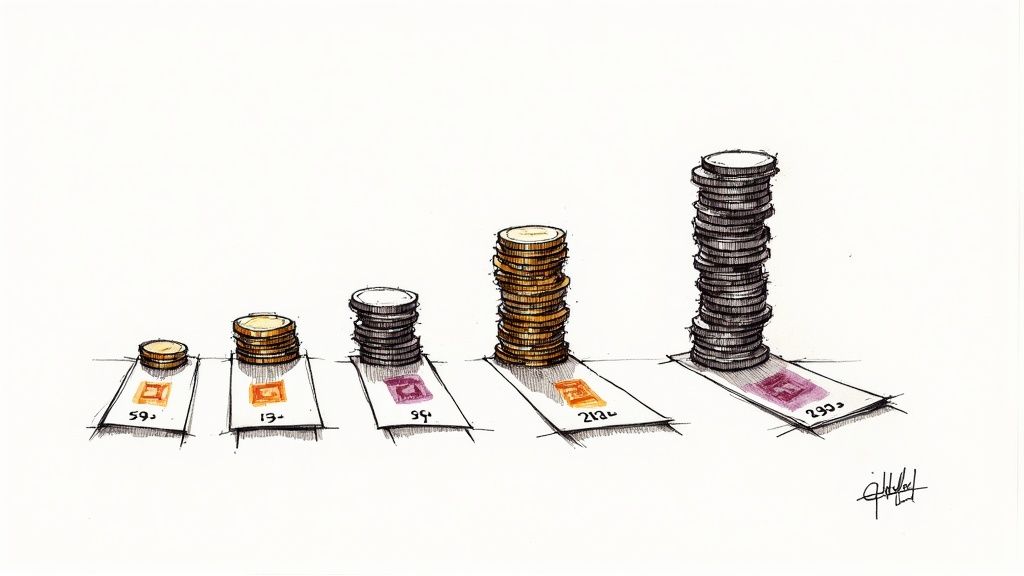
One of the biggest, and frankly most painful, mistakes we see is people cleaning their coins. It's an understandable impulse – you want that old silver coin to look shiny and new. But stop right there. Cleaning a coin can strip away its natural patina and instantly slash its value, sometimes by 50% or more. Any dealer worth their salt will spot an improper cleaning from a mile away.
Another classic error? Jumping at the first offer. You might search for "rare coin dealers near me," walk into the first shop, and get a valuation. Remember, that's just one expert's opinion. It’s always a smart move to get at least two or three appraisals from different reputable dealers. That's the only way to get a real feel for your collection's true market worth.
Spotting a Dodgy Dealer
A good, trustworthy dealer makes the whole process feel transparent and comfortable. A bad one... well, they often rely on high-pressure tactics. You need to know what to look out for.
Keep an eye out for these red flags:
- Rushing You to Sell: A professional will give you plenty of time to think over an offer. If they're pushing you for an immediate decision, it’s often because they know their offer is too low.
- Vague Explanations: They should be able to tell you exactly why your coin is worth a certain amount, pointing to its grade, rarity, and what the market is doing right now.
- Dismissing Your Coins: If a dealer casually brushes off a piece you believe is valuable without a solid explanation, it’s a massive warning sign. Go and get a second opinion.
Your greatest advantage as a seller is knowledge. Understand what you have, recognise the signs of a bad deal, and never, ever be afraid to walk away if something doesn't sit right.
At the end of the day, a reputable dealer wants to be your partner in the sale. They'll guide you with clear information and offer a price that reflects the fair market value. A bad one is only interested in their own pocket. Being prepared and vigilant is the key to making sure you find the right person for the job.
Your Questions Answered: A Coin Dealer FAQ
Stepping into the world of numismatics can bring up a lot of questions, especially when you’re trying to find a local expert you can trust. Getting clear, honest answers is the first step towards making good decisions for your collection. Here are a few of the most common queries we get from collectors across the UK.
Should I Sell My Rare Coins Online or to a Local Dealer?
A local dealer offers security, an expert opinion right there in front of you, and instant payment. This makes it the perfect choice for valuable or large collections. While online marketplaces can certainly cast a wider net for potential buyers, they also come with risks – fraud, shipping headaches, and often hefty seller fees.
For most collectors, especially those with high-value pieces, a reputable local expert provides a much safer and more straightforward experience.
When it comes to significant collections, a trusted local dealer is almost always the more secure and reassuring choice. That peace of mind from a face-to-face transaction is priceless when dealing with rare items.
What Does a Professional Coin Valuation Cost in the UK?
Many dealers will give you a free, informal appraisal if you're thinking of selling your collection to them. It's common practice and helps you both understand what you're working with.
However, if you need a formal written valuation for insurance or probate, there will be a fee. This usually falls into an hourly rate of £50 to £150, or sometimes a small percentage of the collection's total value. It's absolutely crucial to ask about any potential costs and get a clear answer before you agree to a formal appraisal.
What's the Difference Between a Coin Dealer and a Pawnbroker?
The difference is night and day, and it’s a crucial one. A coin dealer is a numismatic specialist. They have a deep understanding of a coin's collectible value, which is a complex mix of rarity, condition, history, and provenance. Their expertise allows them to see the value far beyond the raw metal.
A pawnbroker, on the other hand, is a generalist. They provide loans against all sorts of assets and typically lack any specialist numismatic knowledge. Their offer will almost certainly be based on the coin's scrap metal content or a fraction of its market value, completely missing the all-important collectible premium.
Do I Need an Appointment to Visit a Coin Dealer?
While some high-street shops are happy for you to pop in for a quick look, it’s always best practice to call ahead and book an appointment. This is especially true if you have a large or highly specialised collection that deserves proper time and attention.
Booking ahead ensures the right expert is available and can dedicate their time entirely to you. This makes for a much more focused, productive, and unhurried consultation, giving your coins the professional assessment they deserve.
At Cavalier Coins Ltd, we're passionate about helping collectors at every stage of their journey. Whether you're looking to value a cherished collection, find a specific piece, or simply get some expert advice, our team is here to assist. Explore our extensive selection of rare coins and banknotes from around the world at https://www.cavaliercoins.com.
